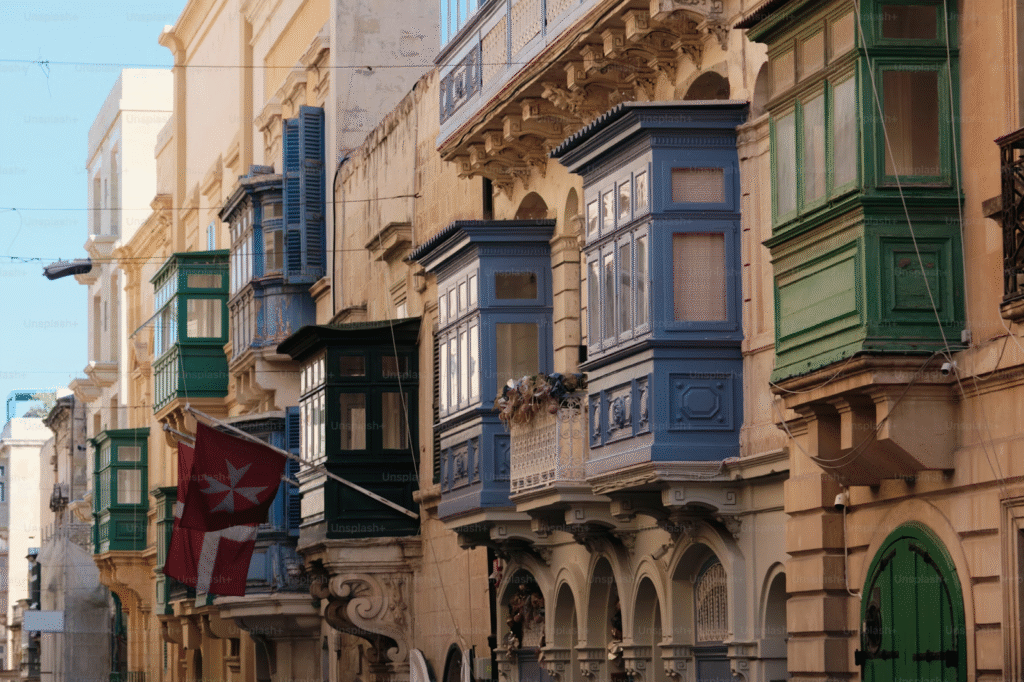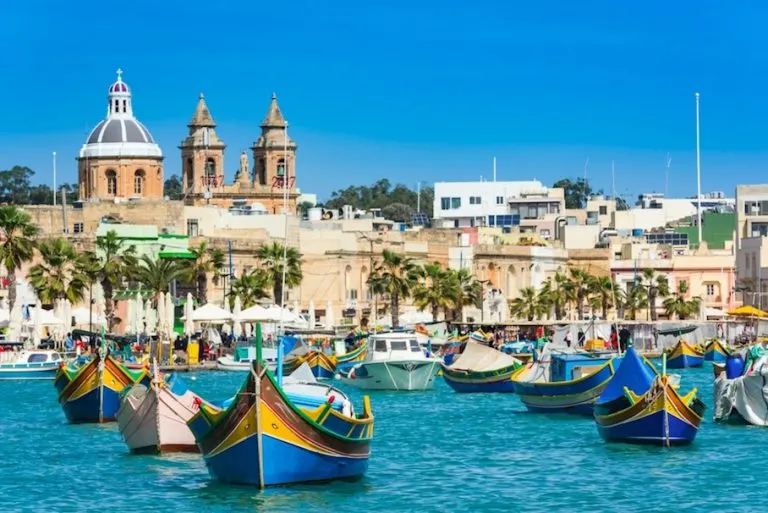🇲🇹 Ready to start a new adventure across the Channel? If you’re planning a move to Malta, this guide will give you all the practical steps, updated costs, and streamlined advice you need for a smooth transition.
What should I know about living in Malta at a glance?
• Flag: 🇲🇹
• Population: ~0.55 million (national, 2025)
• Currency: Euro (EUR) — Prices are usually compared internationally in USD.
• Average salary: around EUR 27,000 per year (~USD 29,000)
• Live EUR ←→ Dollar: Use dynamic currency converters for the latest exchange rates (NSO Malta, 2025; Central Bank of Malta, 2025, centralbankmalta.org ; Eurostat, 2025; XE, 2025)
Reviewed by National Statistics Office Malta (NSO), June 2025; Central Bank of Malta, last updated July 2025; XE Financial Data Team, last updated July 2025.

How much does it cost to move door-to-door to Malta?
The cost of moving to Malta depends on shipment size and transport method. Typical market rates as of mid-2025 are:
| Move Type | Time | Cost (EUR or USD) |
| 20 ft container (FCL)⁺ | ~3–5 weeks | USD 2,000–2,600 (≈ EUR 1,850–2,400) for a 20-ft FCL from Europe/USA to Malta — BR LOGISTICS |
| 40 ft container (FCL)⁺ | ~3–5 weeks | USD 3,400–5,000 (≈ EUR 3,150–4,600) depending on origin & route — BR LOGISTICS +1 |
| Air freight (~1 m³ / ~200 kg, door-to-door) | ~5–10 days | Typically much more expensive; often several thousand USD depending on urgency & distance (not enough public data for a stable benchmark) |
| Customs & duties fees | — | Malta import duty rates range from 0–12% on CIF value, plus 18% VAT applied on the import value including duty & shipping costs — DHL +1 |
Reviewed by Freight & Logistics market sources & Malta customs/tax guides, last updated mid-2025.
Use a real-time moving cost calculator for tailored quotes with ReloAdvisor.
Real-life case:“I moved to Malta in April 2025 with about 25 cubic meters of personal belongings using a 40ft container from Los Angeles. The total cost—including door-to-door pick-up, sea freight, and delivery to my apartment in central Valletta—was around USD 5,400. The relocation company in Malta handled customs clearance at the Port of Valletta and arranged final delivery despite narrow streets and limited parking access in the historic city center.”— Elena R., moved in April 2025
Importantly, many people moving to Malta choose to relocate to one of the five most popular cities, including Valletta, Sliema, St. Julian’s, Birkirkara, and Mdina. These cities combine strong infrastructure, diverse job markets, and vibrant expat communities, making them ideal destinations for newcomers planning to move to Malta.
What do I need to know about Malta visas and residency?
Most foreigners require a visa or residence permit to live in Malta. Options include: Work Visa, Student Visa, Family or Partner Visa, Investor or Startup Visa, and the Residence or Long-Term Residence Permit options available after extended stay.
- Visa categories and eligibility check: https://www.identitymalta.com
- Visa/residence permit application portal (for appointments and documents): https://www.servizz.gov.mt/en/Pages/Home.aspx
Reviewed by Identity Malta Agency (IMA), last updated June 2025
What are the customs and duty rules when moving belongings?
If you’re relocating to Malta, you may qualify for duty-free import of used household goods under Malta Customs Department regulations. To be eligible:
- Items must have been owned and used for at least 12 months prior to shipment.
- Goods must arrive within 12 months of your arrival in Malta.
At customs, present:
- Detailed inventory list of goods
- Passport and valid visa/residence permit
- Proof of prior residence abroad (e.g., rental agreement, utility bills)
⚠️ New items, vehicles, alcohol, tobacco, or commercial goods may be subject to Malta’s import duties and VAT of 18%, applied on the customs value including freight and insurance (CIF).
Reviewed by Malta Customs Department, last updated mid-2025

How can I bring pets with me to Malta?
Pets must be microchipped, vaccinated against rabies, and accompanied by an import permit issued by the Veterinary Regulation Directorate (VRD) under the Ministry for Agriculture, Fisheries and Animal Rights. A valid rabies antibody (titration) test may be required depending on the country of origin.
Import requirements vary by species, and all pets must arrive through approved entry points, such as Malta International Airport (MLA) or the Grand Harbour for sea arrivals.
Reviewed by Veterinary Regulation Directorate (VRD), Government of Malta, last updated March 2025
What’s required to import a car or swap a driving licence?
Vehicles must comply with Malta’s emissions, safety, and registration standards. Import duties, Value Added Tax (VAT) of 18%, and vehicle registration fees apply.
Driver’s licences from certain countries with reciprocal agreements (e.g., EU/EEA countries, the United Kingdom, Australia) can be converted directly. Others (e.g., USA, India, China, South Africa) generally require passing both a theory and practical driving test before a Maltese licence is issued.
Reviewed by Transport Malta (TM) & Malta Customs Department, last updated July 2025
How do I open a bank account and get Malta’s national identity number (Tax ID / Social Security Number)?
To open a Malta bank account, you’ll need:
- Passport and valid visa/residence permit
- Proof of address (rental agreement or utility bill)
- Sometimes proof of employment, student enrollment, or income source
The Tax Identification Number (TIN) — also known as the National Identity or Social Security Number — is Malta’s official tax and social registration number. It is required for taxation, social security, healthcare, and banking purposes.
Your TIN is issued by the Commissioner for Revenue or the Department of Social Security after registering your residence in Malta.
Reviewed by Commissioner for Revenue Malta (CFR) & Department of Social Security, last updated November 2024 |
How to Navigate the Housing Market as a Newcomer to Malta?
In Malta, renting usually requires a security deposit (normally one month’s rent) and proof of stable income or financial means. Utilities such as electricity, water, and internet are often not included in the rent.
To rent, you’ll need:
- Passport and valid visa/residence permit
- Proof of income or employment/study contract
- Tax Identification Number (TIN) or residence registration
To buy property in Malta, budget an extra 3–5% for notarial fees, stamp duty, and transaction costs. Non-EU citizens may require an Acquisition of Immovable Property (AIP) permit from the government.
Top areas for newcomers:
- Valletta – capital city, cultural and administrative hub
- Sliema – modern apartments, seafront lifestyle, shopping area
- St. Julian’s – entertainment and expat-friendly nightlife zone
- Birkirkara – residential and affordable inland area
- Mdina – historic old town, quiet living, unique atmosphere
Reviewed by National Statistics Office (NSO) Malta Developers Association (MDA), last updated March 2025 |
How to Understand Your Tax and Pension Obligations in Malta?
If you’re a tax resident in Malta (living more than 183 days per year), you’re generally taxed on your Maltese-source income and foreign income remitted to Malta. Contributions to social security and pension schemes are standard for employees under local contracts.
| Tax Component | Description | Notes |
| Income Tax | Progressive rates: 0%–35% depending on income | Non-residents are taxed only on Malta-sourced income |
| Social Contributions | Covers state pension, public healthcare, and social benefits | Employee contributes around 10%; employer contributes 10% (subject to caps) |
| Double Tax Treaties | Prevent double taxation | Malta has agreements with 70+ countries, including UK, USA, Canada, and EU members |
Reviewed by Commissioner for Revenue (CFR) Malta & Department of Social Security, last updated 2025
Where can I find tools and more resources before moving?
For further guidance, make use of the volume calculator, book a video survey, or explore comprehensive guides for New Zealand and Australia with ReloAdvisor.



